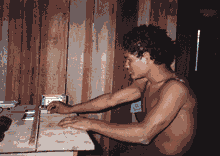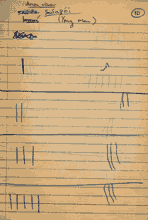
Tricky lineup. A Pirahă tribesman's number sense goes hazy after three. Pirahă adults could not successfully copy lines on a piece of paper. (right)

Although children of the Brazilian Pirahă tribe can learn numbers, adults don't use numbers over two and are baffled by simple number exercises.
from Science......the journal of the American Association for the Advancement of Science
August 20, 2004
COGNITION:
Life Without Numbers in the Amazon
Constance Holden
To what extent can concepts exist without the words to express them? That question has long occupied philosophers and linguists. Now, in an article published online this week by Science, Peter Gordon of Columbia University has added to the debate with an unusual study on mathematical thought. Among members of a tiny tribe in the Amazon jungle that has no words for numbers beyond two, the ability to conceptualize numbers is no better than it is among pigeons, chimps, or human infants, the psycholinguist finds. The research suggests that "without a language for numbers, people don't develop an ability to perceive exact numerosities," he says.
The Pirahă, a hunter-gatherer tribe of about 200 people, live in small villages on a tributary of the Amazon. They have little social structure and no art, and they barter instead of using currency. They also have one of the world's most phonemically limited languages, with just 10 consonants and vowels. Although the Pirahă have words for one and two (hói and hoí), even those only indicate approximations, says Gordon.
A decade ago, Gordon visited the Pirahă to conduct fieldwork with linguist Daniel Everett, now at the University of Manchester, U.K., and his wife Keren, who spent 20 years with the tribe. Gordon gave a series of tests to the men (women and children were too shy to participate) to see how they dealt with concepts that have no representation in their language.
Even in the simplest task-- asking them to duplicate a row of up to 10 batteries he placed on a table--he found that the Pirahă performance started to decay after two or three batteries. They also did very poorly in a task requiring them to copy lines on a piece of paper (see picture). Tasks requiring cognitive manipulations of numbers were also beyond them. For example, the men could not retain the memory of a number, as demonstrated in a test where eight nuts were shown to them and then placed in a box.
 |
Tricky lineup. A Pirahă tribesman's number sense goes hazy after three. Pirahă adults could not successfully copy lines on a piece of paper. (right)
|
 |
||||
|
|
Perhaps the most striking result came from a test in which the men saw a piece of candy being put into a box with a picture of several fish on the lid. They were then shown the box with the candy in it and another box that had either one more or one fewer fish on its lid and asked to choose a box. Even though a correct guess meant a candy reward, subjects did no better than chance. Their performance "looks like what you see in infants or animals; the notion of a precise one-to-one correspondence is not there," says Gordon.
Although some linguists have hypothesized that humans possess an innate number sense, Gordon contends that his results cast doubt on this theory. "What's innate is being able to see [specific numbers] up to three," says Gordon, who believes that this limitation is related to the fact that the Pirahă language is not recursive. For example, it is impossible for villagers to make comparisons such as "this pile of nuts is bigger than that pile." Instead they would say one pile is big and the other is small.
Calling the study "fantastic," psychologist Lisa Feigenson of Johns Hopkins University in Baltimore, Maryland, says that language must be causing the "drastic" difference in the number sense of the Pirahă. Feigenson notes, however, that other cultures with limited number terminology have developed ways of expressing the concepts.
Gordon says that the study favors a hypothesis by linguist Benjamin Lee Whorf, who believed that language is more a "mold" into which thought is cast than it is a reflection of thought. Everett takes a somewhat more interactive view, believing that the absence of both words and concepts for numbers is "the result of cultural constraints against quantification."
That view seems to be bolstered by the Everetts' attempts to teach the Pirahă numbers. Although children easily learned number words in Portuguese, the adults lost interest during the lessons. Everett also says years of attempts to teach adults to use the Brazilian currency came to naught, with adults telling him that "their 'heads were too hard' " for this type of thing.
Below is the Reuters article cited above.
Amazon Natives Skip the Math
Study sheds light on link between numbers and words
Members of a tiny, isolated Brazilian tribe have no words for numbers other than “one,” “two” and “many,” and seem to have trouble counting, the researchers reported.
The Piraha tribespeople are clearly intelligent, so the finding opens questions into how language may affect thinking, the researchers say in this week’s issue of the journal Science.
Peter Gordon of Columbia University in New York and colleagues studied the Piraha because there had been reports about their unique use of numbers.
“I was able to take three field trips ranging from one week to two months living with the Piraha along with Dr. Daniel Everett and Keren Everett, two linguists who have lived and worked with the tribe for over 20 years and are completely familiar with their language and cultural practices,” Gordon writes in his report.
“They live along the banks of the Maici River in the Lowland Amazonia region of Brazil. They maintain very much of a hunter-gatherer existence and reject assimilation into mainstream Brazilian culture,” he added.
Language
limitations
There are only about 200 Piraha, and they live in groups of 10 to 20.
Their words for numbers appear limited to “one,” ”two” and “many,” and the
word for “one” sometimes means a small quantity.
“There is no word for ’number,’ pronouns do not encode number (e.g., ‘he’ and ‘they’ are the same word), and most of the standard quantifiers like ‘more,’ ‘several,’ ‘all,’ ‘each’ do not exist,” Gordon wrote.
Gordon got the tribespeople to take part in some number matching tests.
“In all of these matching experiments, participants responded with relatively good accuracy with up to two or three items, but performance deteriorated considerably beyond that up to eight to 10 items,” he wrote.
“Piraha participants were actually trying very hard to get the answers correct, and they clearly understood the tasks,” Gordon said in a statement.
Children
could learn large numbers
While Piraha adults had difficulty learning larger numbers, Piraha
children did not.
“One can safely rule out that the Piraha are mentally retarded. Their hunting, spatial, categorization and linguistic skills are remarkable, and they show no clinical signs of retardation,” Gordon added.
They also show some other unexpected differences from many world cultures.
“Not only do the Piraha not count, but they also do not draw,” Gordon wrote. “Producing simple straight lines was accomplished only with great effort and concentration, accompanied by heavy sighs and groans.”